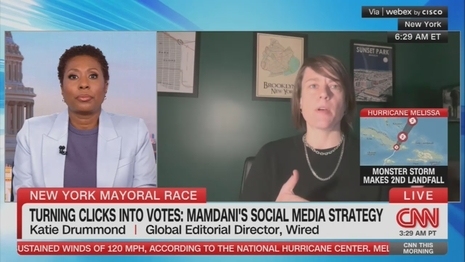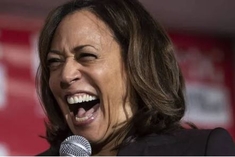 Remember that "wave of intense support" for Kamala Harris in the summer of 2024, stemming from her social media campaign using terms like "brat" and "coconut?" Me neither.
Remember that "wave of intense support" for Kamala Harris in the summer of 2024, stemming from her social media campaign using terms like "brat" and "coconut?" Me neither.
But Audie Cornish does! On Wednesday's edition of CNN This Morning that she hosts, Cornish brought on Katie Drummond of the leftist magazine Wired to explain why Zohran Mamdani's social media campaign has been so successful. Cornish mentioned Drummond wrote a piece on Mamdani "The Internet's Mayor," and Drummond celebrated him for "a really, really good social strategy."
So why did Kamala flop?
CORNISH: Mayoral candidate Zohran Mamdani is, of course, a viral sensation. He's built his run on followers, likes, shares. The 34-year-old is a millennial, after all. We saw a similar strategy play out in last year's presidential election. Social media hype, however, didn't pay off come election day for Kamala Harris.
When I look at Kamala Harris, and we think about Brat/Coconut Summer, there was this sense of like a wave of intense support, right? And attention. Why do you think that that didn't quite translate the same way?

Drummond eventually came up with something that made sense. She said that a "differentiator" between the two campaigns is that as lighthearted as some of Mamdani's social media has been, it was always tied to his campaign's substantive themes. "He's not just talking about coconuts, right? These are not just like memes and jokes."
I'd say that, notwithstanding his disastrous policies, Mamdani comes across as genial, well-spoken, and reasonably authentic. Compare/contrast with strange, word-salad Kamala. Drummond proclaimed that Wired was totally behind her last November:
Donald Trump, the GOP, and the throng of conspiratorial, racist, dangerous enablers who surround them have completely lost touch of, putting this country’s future at great risk. In other words, we’re voting for Kamala Harris. The alternative is a future too abhorrent for even the most dystopian imaginations at WIRED to contemplate.
Now, during that abhorrent future, we'll see how long the smile lasts once Mamdani, as is presumed, wins the election, and takes on the burdens of the office and the results of his socialist policies.
For example, Andrew Cuomo has said that Mamdani's promise to make bus fares free will turn buses into "mobile homeless shelters." As a Washington Post editorial graphically put it [emphasis added]:
"Vagrants and drug addicts would camp out all day on New York’s buses, especially in the winter. Parents would grow afraid to let their children ride alone. Wealthier residents would find another way to get around, but poor New Yorkers who depend on the bus would suffer the most."
Here's the transcript.
CNN This Morning
10/29/25
6:28 am EDTAUDIE CORNISH: That mayoral candidate, Zohran Mamdani, is of course a viral sensation. Can he turn clicks into votes?
MAMDANI SUPPORTERS DANCING AND SINGING: The name is Mamdani. M-A-M-D-A-N-I.
CORNISH: So, he's built his run on followers, likes, shares. The 34-year-old is a millennial, after all.
We saw a similar strategy play out in last year's presidential election. Social media hype, however, didn't pay off come election day for Kamala Harris. But Mamdani tells Wired he's expecting a different outcome.
. . .
Now Wired calls him the internet's mayor, crediting his, quote, really, really good social strategy in making him a media machine. Joining me now to discuss, Katie Drummond, global editorial director at Wired. Katie, thanks for being with us this morning and bringing us that tape. You spoke with Mamdani. Can you talk, he is a community organizer. He has come up in organizing, so he understands retail politics. How has he turned the internet and social media into its own kind of retail politics?
KATIE DRUMMOND: Well, first of all, thank you for having me. And you know, that's exactly right. I think what Mamdani has done from the beginning is
he has used these social platforms where he is able to amass enormous scale to connect directly with an electorate, right? To connect directly with different populations, to do it in a way that feels authentic to them, and to galvanize them from digital platforms into physical spaces.So we see that, you know, with several initiatives that his campaign has undertaken. For example, they announced, you know, a scavenger hunt through New York on TikTok. They had 5,000 people turn up in the streets of New York to participate.
So he has really effectively been able to take his online reach and influence and translate that into physical, sort of feet on the ground New Yorkers, showing up for his campaign.
CORNISH: How does work for campaigns, though? When I look at Kamala Harris, and we think about brat/coconut summer, there was this sense of like a wave
intense support, right? And attention. Why do you think that that didn't quite translate the same way?DRUMMOND: Well, you know, it's hard to tell. We were talking in that federal election about a vastly different context. But I think that one differentiator for Mamdani, and what he has online, is that, you know, he's not just talking about coconuts, right? These are not just like memes and jokes. He is using the platform, sometimes in a lighthearted way, but always to articulate his campaign priorities and to do that with very simple, clear language. And I think that that sort of differentiator gives substance to his approach to social media.





